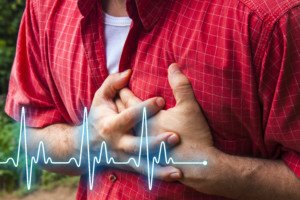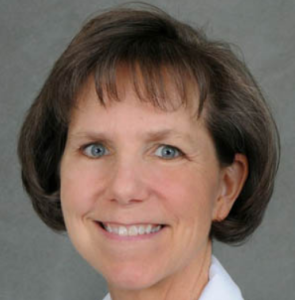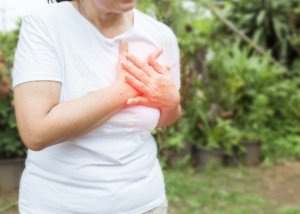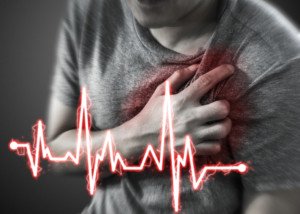
Can chest pain in a physically fit person with low heart disease risk be caused by a soft plaque rupture?
“Recent literature suggests two different kinds of plaque: calcified plaque which is considered more stable and less likely to rupture; and soft plaque which is considered to be more lipid-laden and more likely to rupture,” says Monica Reynolds, MD, a cardiologist with ColumbiaDoctors Medical Group in White Plains, NY.
The coronary calcium score test measures only the calcified plaque, and the amount is converted to a numerical value.
There is a strong correlation between numerical value and likelihood of heart disease and near-future cardiac events.
However, in a person with a low or zero calcium score, or, to put another way, very little “sludge” in their coronary arteries, it’s not impossible for them to experience a soft plaque rupture.
After all, the soft plaque in a fit, nonsmoking athlete with a healthy lifestyle is just as “unstable” as the soft plaque in a sedentary, diabetic, junk-food eating person with high blood pressure.
The classic cause of cardiac chest pain other than heart attack is a condition called angina.
This is when blood flow in the coronary artery is temporarily restricted, causing chest pain (and sometimes shortness of breath).
Usually there’s a trigger, namely physical exertion and/or high-charged emotions.
But I wondered about chest pain from a soft plaque rupture that resolves after a few minutes, something that might explain a sudden unfolding of chest pain for no reason (no physical exertion) that then goes away after a few minutes or so.
Obviously, a rupture is more likely to happen in a person with a ton of soft plaque versus in someone with a small amount. But having a small amount of soft plaque doesn’t guarantee no rupture.
How do you know if that recent chest pain was a soft plaque rupture?
Especially if you have low risk for heart disease?
“As with any biological system, there really is no ‘rule’ – only trends,” explains Dr. Reynolds.
“Obviously, those with risk factors TEND to develop more extensive coronary disease sooner than those without risk factors. But no one is guaranteed not to get coronary disease.”
Heart Attack & Plaque
“Many years ago, it was felt that most plaque builds up gradually over years until it eventually reaches a critical mass in obstructing the blood flow and the patient develops symptoms,” says Dr. Reynolds.
“More and more, however, we have come to appreciate that plaque buildup is not really a smooth process but can be described as a series of small ‘eruptions’ followed by healing.
“A small bit of plaque in an artery ‘ruptures’ and exposes the undersurface to the bloodstream where platelets and other clotting factors are stimulated to repair the rupture.”
- What happens when you pick off a scab?
- The scab is replaced by an even bigger scab.
“In a similar way, when the ruptured plaque is repaired, the new plaque is a little larger,” continues Dr. Reynolds.
“With repeated ruptures, the plaque can eventually reach critical mass and cause symptoms which prompt a cardiac workup and can lead to elective catheterization and stenting.
OR – the rupture can lead to such a vigorous platelet and clotting factor response that the artery goes from having mild non-obstructive plaque to total occlusion [blockage] in a matter of minutes.
“An acute rupture is now considered the mechanism for many of the patients who present with an acute heart attack or unstable angina.”
What are the odds that any given chest pain can be a soft plaque rupture?

Shutterstock/Aaron Amat
This question applies to chest pain that doesn’t have an apparent trigger. For example, mild chest pain can result from the motility of fecal matter building up through the large colon.
Some of the large colon runs in the upper abdominal area, so if a good chunk of BM is being transported through, it can cause mild chest pain.
The chest pain will gradually vanish, and then you’ll realize you have to do a big No. 2.
Acid reflux causes chest pain. Does it occur only when you lie down? That’s a tip-off, though acid reflux can hit when you’re upright.
Does “chest pain” occur only upon exhalation or inhalation? It’s likely a strained muscle or inflamed cartilage.
What about occasional chest pains that come out of the blue?
“Could it be plaque rupture and angina?” says Dr. Reynolds. “Maybe …. but I wouldn’t start with that. Each person is unique. Each comes with his/her own set of risk factors.
“Life is full of aches and pains. The overwhelming majority are NOT life-threatening. Common sense must prevail or we will be spending every waking hour in the hospital ER.”
Dr. Reynolds regularly sees patients for chest pain. “Very rarely is it ‘classic angina’ – it is usually some atypical presentation.
“Each time a patient comes in for an evaluation of chest pain, I do a complete history and get a good description of the pain.
“I do a physical exam and check the EKG. I assess the risk factors. If there is a moderate risk for heart disease, I will refer for a stress test and sometimes (not often) in patients with atypical pain, the stress test is positive.
“Those patients often go on to have a cardiac catheterization and some get a stent.
“And guess what – it is not uncommon that the patients with really atypical pain [who underwent stenting] come back to my office a few weeks later and STILL HAVE THE PAIN.
“Why? Because the pain wasn’t cardiac to begin with, but we just happened to find some coronary disease because, guess what – coronary disease comes with age!”
Kick Back the Soft Plaque
“Bottom line – do not walk around in a state of overwhelming anxiety about what might pop up around the next corner,” says Dr. Reynolds. “Eat right. Exercise. Don’t smoke. Enjoy life.
“Anxiety can only make everything worse – raise your BP and cholesterol, age you faster and maybe even accelerate heart disease. No one is immune to heart disease. But you must keep this in perspective.”
A hardcore overhaul of dietary habits can reverse soft plaque buildup.
Add rigorous exercise and you’ll reverse any heart disease even faster.
Think of all the exercise people did before machines took over.
 Since 1992 Dr. Reynolds has practiced clinical cardiology at ColumbiaDoctors Medical Group, one of the largest multi-specialty practices in New York State.
Since 1992 Dr. Reynolds has practiced clinical cardiology at ColumbiaDoctors Medical Group, one of the largest multi-specialty practices in New York State.
 Lorra Garrick has been covering medical, fitness and cybersecurity topics for many years, having written thousands of articles for print magazines and websites, including as a ghostwriter. She’s also a former ACE-certified personal trainer.
Lorra Garrick has been covering medical, fitness and cybersecurity topics for many years, having written thousands of articles for print magazines and websites, including as a ghostwriter. She’s also a former ACE-certified personal trainer.


























